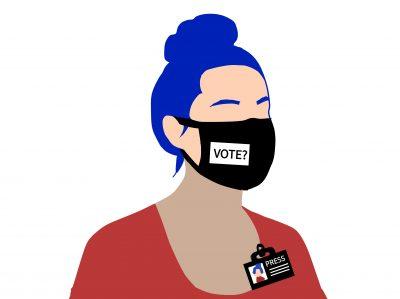A longstanding pillar of journalism mandates those of us involved in newsgathering and truth-telling hide our biases, which is a hard task when everything down to basic human rights is partisan.
Newsroom policy tells us to refrain from sharing political beliefs on social media, donating to political campaigns and reporting on any activity we have a personal connection to, all for fear of skewing our perceived objectivity.
But where is the line?
There is a point at which we step so far into our endeavor for “objectivity” that we compromise our own democratic rights — namely, the right to vote. The question of whether journalists should head to the polls, especially in an election as controversial as this, has persisted in industry dialogue.

To refrain from voting, however, is neither effective nor ethical in ensuring objectivity.
In short, journalists should vote because they are citizens who have the right and civic duty to do so. But it’s also so much more than that.
Journalists wake up every day and choose to defend democracy by holding its caretakers accountable. It only makes sense for us to participate in a system we so valiantly protect.
We contribute to society beyond the work we do, because, as real people, we do not simply observe and do nothing else. Reporters don’t exist in a vacuum separate from the rest of the world. Instead, we’re even more integrated in it because our job and passion demands that we strive to understand it.
Journalists are some of the most informed people in the country. We ask hard questions, conduct extensive research and provide vital information to the public. We should be drawing upon this knowledge to push our governments in what we feel is the right direction.
We live in a country where votes actually matter. As journalists, choosing not to vote implies we are willing to perform the essential work we do without representation in our own republic.
And because we are knowledgeable on the candidates and issues on the ballot, the decision to abstain also connotes a political idea in itself: we are so unaffected by policy that we can be satisfied with any outcome.
That, of course, is likely untrue anyway. So, to be unsatisfied with current conditions yet not take action to change them, despite having the power to, is nothing more than cowardly.
Yes, voter registration records are public, and if someone were to dig up this information, they would uncover our political leanings. But party registration is not some secret we should stow away in fear.
To allow ourselves to vote freely, even if some of how we do so is public, is to be transparent about our opinions.
It’s important to acknowledge, however, that this is vastly different from amplifying personal opinions through a public platform or letting it seep into the work we do for the people we serve, who we know will not all share the same perspectives.
A social media post declaring an opinion is an attempt to convince an audience of an argument. Voting, on the other hand, is truly just participating in democracy. If that reveals our political beliefs, then so be it.
Try as we might to overcome our own political leanings, it would be dishonest to pretend journalists are not just as human as any other citizen. The transparent reality of it is: unless the news is reported solely by robots — and even those are programmed by humans — it’s simply impossible to be 100 percent free of bias.
All we can really do is ensure we recognize our biases and work consciously to keep them out of our reporting.
To counteract the possibility of inserting a slant into stories, we take a variety of precautions:
Each story, at least at a student newspaper like The Daily Free Press, travels across multiple desks where editors fact-check and probe for skewed perspectives. Editors assign stories carefully to ensure reporters aren’t personally involved in, say, a campaign or organization featured.
Photojournalists, too, hold themselves to ethical guidelines that aim to ensure the work they produce will accurately depict the full story. Any form of editing, even an action as simple as cropping a photo, can connote questionable intent.
Any published bias erodes the credibility of not just a specific news organization, but the news industry as a whole — because this is a field that rises and falls together.
We are the protectors of democracy, and in turn, the founding document of our democracy works to protect us. In this way, journalism and democracy are intertwined, so it would only be responsible for journalists to participate fully in it.





















































































































